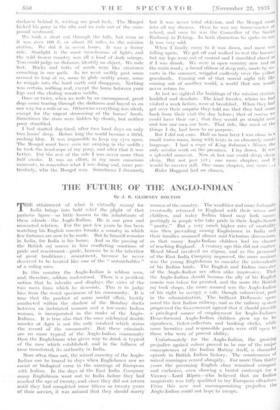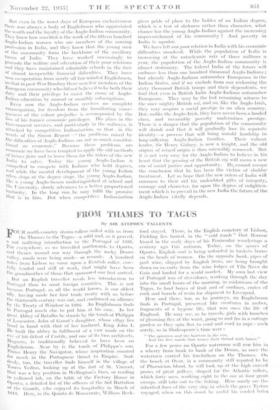THE FUTURE OF THE ANGLO-INDIAN •
By J. R. GLORNEY BOLTON THE attainment of what is virtually swaraj for India brings into bold relief the plight of that pathetic figure—so little known to the inhabitants of these islands—the Anglo-Indian. He is our poor and unwanted relation. For the past few years he has been watching his English cousins forsake. a country in which few fortunes are now to be made. But he himself remains in India, for India is his home. And so the passing of 'the British raj rouses in him conflicting emotions of pride and resentment—pride, because he is the inheritor of great traditions ; resentment, because lie never deserved to be treated like one of the untouchables " of a ruling race.
In this country the Anglo-Indian is seldom seen, and, therefore, seldom understood. There is al, pestilent `notion that he inherits and displays the vices of the two races from which he descends. This is to judg.0 him front the worst specimens of his community. It is :true that the product of some sordid affair, hastily conducted within the shadow of the .Bombay doeks between an inebriated seaman and at low-caste Indian woman, is incorporated in the ranks of the Anglo- Indians. It is true also that the once celebrated double murder at Agra is not the only misdeed which stains the record of the community. But these criminals are no more typical of the AnglO-Indian community than the Englishman who gives way to drink is typical of the race which established, and in the fullness of time transferred, its authority in India.
More often than not, the mixed ancestry of the Anglo- Indian can be traced to days when Englishmen saw no social or biological error in the marriage of European with Indian. In the days of the East India. Company ninny Englishmen went out to India before they had 'reached the age' of twenty,.and, since they did not return until they had completed some fifteen or twenty years of their service, it was natural that they should marry women of the country. The wealthier and more fortunate eventually returned to England with their wives sirxl 'children, and today Indian blood may lurk unsas7 pectingly in people who take pride in their Anglo-SaNc0 " purity." But a very much higher rate of mortality was then prevailing among Englishmen in India and their families assumed almost mid-Victorian dimensions. so that many Anglo-Indian children had no chance of reaching England. A century ago this did not matter. Mixed blood involved no stigma, and as the personnel 'of the East India Company improved, the more anxio' was the young Englishman to consider the antecedent' of his Indian bride. The English and Indian t•tneestrY of the Anglo-Indian are often alike impressive. That time Anglo-Indian should become the ally of his English cousin was taken for granted, and the more the Brit ,raj took shape, the more assured was the Anglo-Indigo of his right to occupy a safe, though subservient, post in the administration. The brilliant Dalhousie spoil' sorecl'the first Indian railway, and as .the railway system progressed the Government agreed that it should provi0 a • privileged source of employment. for Anglo-Indians. Henceforward Anglo-Indian children grew, up to be :signalmen, ticket-collectors and booking clerks, 10100 more lucrative and responsible posts were still open to those who were of proved ability.• Unfortunately for the Anglo-Indian, the . growing prejudice against colour proved to be one of the major consequences of the Indian Mutiny itself, a shameful episode in British Indian history. The countenance 01 mixed 'marriages ceased abruptly. For more than thirtY years the governing English class remained arrogant and exclusive, even showing a brutal contempt for ti Viceroy—Lord Ripon—who believed that an Indiali magistrate was fully qualified to try European offenders; From this new and uncompromising prejudice the Anglo-Indian could not hope to escape. But even in the worst clays of European exclusiveness there was always a body or 'Englishmen who appreciated the worth and the loyalty of the Anglo-Indian eominunitv. Ile' knew•how unselfish is the work of the fifteen hundred Anglo-Indian women who are members or the nursing profession in India, and they knew that the young men of the community form the backbone of the auxiliary forces of India. They have worked unceasingly to Promote the welfare and edtleation or their poor relations mid they have maintained admirable schools in the Mee IA almost insuperable financial difficulties. They have welt co-operation from nearly all fair-minded Englishmen, 'BO that in post-War Boinbay there were few members of the huropean community who did not believe it to be both their duty and their privilege to assist, the cause of Anglo- Indian education by annual or monthly subscriptions. • Even now the Anglo-Indian receives no complete emancipation, for freedom from the • humiliating, eonse- 'cluences of the colour prejudice is accompanied by the loss of his former economic privileges. Once in the Government services; mid particularly in the railways, is attacked by competitive lndianisa iou, so that—in the 'words of the Simon Report—" the problems raised by 'the difficulties of Anglo-Indians arc not so much constita- tional as •economic." Because these problems are 'economic we have been tempted to apply the old methods 'of laisser fain? and to leave them for the rulers or the new India to solve. Today the young Anglo-111(1;mi is compelled to compete with Indians who Judd degrees, and while the mental development of the young Indian often stops at the degree stage, the young Anglo-Indian, like a young Anglo-Saxon undistinguished at school and the University, slowly advances to a better proportioned Maturity. In the long run. he• may 'fulfil the promise that is in him. But when competitive Indianisation gives pride of place to the holder of an Indian degree, which is a test of slickness rather than character, what chance has the young Anglo-Indian against the increasing impoverishment of his community ? And poverty in India is squalor.
We have left our poor relation in India with his economic difficulties unsolved. While the population of India is increasing at the 'cataclysmic rate of three millions 'a year, the Population of the Anglo-Indian community is almost stationary. The federal India of the future will embrace less than one hundred thousand Anglo-Indians ; • but already Anglo-Indians outnumber Europeans in the Indian States, and if we ejcclude from our reckoning the sixty thousand British troops and their dependents, we 'find that even in British India Angle-Indians outnumber Europeans. They may be the last remaining witness to the once mighty British raj, and so; like the Anglo-Irish, they may acquire a social prestige in an alien country. But, unlike the Anglo-Irish, they have never been a landed class, and invariably poverty undermines prestige. There is a danger that the population of the community will shrink and that it will gradually lose its separate identity—a process that will bring untold hardship ti) long-sliffering Anglo-Indian families. Their valiant leader, Sir Henry Gidney, is now a knight, and the old stigma of mixed origin is -thus ostensibly removed. But it is not very easy for the Anglo-Indian to believe in his heart that the passing of the British raj will mean a new era of social justice and opportunity. He, cannot escape the conclusion that he has been the victim of shabby treatment. Let its hope that the new rulers of India will stininion to their aid his undoubted gifts of integrity, courage and. character,. for upon the degree of enlighten- ment which is to prevail in the new India the future of the Anglo-Indian vitally depends.































































































 Previous page
Previous page